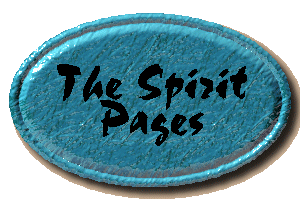









Welcome to Ishaia's
Spirituality Page
Spirituality Page
My idea of Spirituality does not have a name. It does not have "rules," but rather
principles. It does not tell a person how to dress, how long or short one should wear
their hair, whether men must or must not wear facial hair, what to eat, when to fast.
It does not demand sexual abstinence or excesses. There are no rituals, ceremonies or
memorized prayers. It is not written down in sacred text. My idea of spirituality is
not set in stone, but rather lives and breathes in the heart, where Spirit dwells.
It recognizes truth in many ways, but mostly by understanding and feeling
the truth of a statement or belief. It allows the Seeker to seek in his or her own
way, and to find in his or her own time. It lets the Seeker decide when and how to
find what he or she needs to understand. It allows for time off to pursue less
spiritual matters, and it allows for deep retreats and searching.
To me, to wrap spirituality in a cloak of religious doctrine and dogma is to smother
the Truth, not to bring it to the light of day. More people in our history on this
planet have died for the sake of religion than for any other reason. It is still
happening today. Each true religion teaches of peace and love, yet most religions
also teach that theirs is the "One True Religion," that none others have any validity.
Why must this be so? Because each bit of Truth that makes its way into our
consciousness is so precious, that those who receive the message become "The Keepers of
the Truth." They are canonized as "special" and "Ordained by God" by their followers,
and vilified as "evil" by their detractors (usually those who prefer the "old order").
For a particularly insightful and hilariously satirical example of this, rent the
video, "Monty Python's the Life of Brian."
There is a lot of truth to a bumper sticker I have seen: "I used to be a Christian,
until my karma ran over my dogma." If you're looking for me to tell you what is True,
you've come to the wrong place. I am willing, however, to tell you what is true for
me. If that doesn't mesh with what is true for you, that's alright, too. We each have
our truth to live, and if we aren't living our truth, then is it really true for us?
Try a little experiment: write down 25 things that you think are true, perhaps rules
your religion demands you to live by, perhaps ways that you think people ought to
live and act toward each other. Then look at your list and see how many ways you
live this truth. You'll have to be brutally honest with this one. My brother-in-law
is Catholic, yet he and my sister used birth control to determine the timing and
number of their children. So, for him, the Catholic doctrine of not using any form
of birth control other than abstinence is not truth. Give it a try. I'm sure you'll
find at least one or two instances where your dogma and your Truth don't quite mesh.
This seems a difficult task for many who call themselves Christian, as most will say,
"Oh, I envy my neighbors their new car, when I must drive this 10-year-old clunker
because I can't afford a new one," or "Well, I have committed adultery, even though it
is against the Ten Commandments," or "I cheat on my taxes, but doesn't everybody?" The
point is, why claim a religious belief if you don't live its doctrine? Most Christians
I have met are very judgemental and negative toward people of other "faiths," or of no
"faith." They say that they are commanded to bring as many people to the Faith as they
can, yet they ignore the Parable of the Good Samaritan, which talks about a man of
another faith (a pagan, by the way), who stops to care for a man who has been injured,
without first asking what that man's faith is, or even caring. The Samaritan helped the
man because he needed help. He didn't stop to think whether the man "deserved" his
help, he simply did what was needed.
So, along your journey on your quest for Truth, stop to think a while about what is
true for you right now, and look at what was true for you several years, perhaps
decades, ago. And consider this: if your beliefs and understandings have changed over the
years, isn't it possible that they can still change yet again? The truth doesn't change,
but our understanding of it may. It is this understanding which should guide us on our
paths, not somebody else's expression of "Truth." However, somebody else may put words
to our truth which we had not yet found. We are all students and teachers, for we teach
that which we most need to learn.
On another note, I must state that I have met many Pagans who are as "fundamentalist"
as any Southern Baptist or Pentacostal I've ever met. It seems that these Pagans have
become Pagan in order to get as far away from Christianity as possible. They have no
tolerance for any Christian or Christian wisdom (yes, there is some wisdom and truth
in that religion), and can actually come off seeming to despise all Christians for the
sake of their faith. To my way of thinking, this is very damaging to their own spirit.
I have walked through old and wonderful cathedrals, admiring the workmanship and spirit
which went into the creation of such glorious places of worship. I am awed by the
Presence which I sense there, no matter which of these old marvels I am visiting.
Spirit does not only dwell in one house or another, it dwells in many houses, churches,
temples, lodges, campfires, hearts. You don't need a special place or time to find Spirit,
for it is everywhere all the time, here/now. How you find it is your task. What you call
it is up to you. How you use the information is for you and you alone.
You know a bit of my truth, if you've already read other pages on this site. What is your
truth?
Moon Lodge
| Prayers
| Rituals
| Shamanism
| Spirituality
| Wicca

Lodge
| Ishaia
| Gallery
| Gracias
| Joy
Library
| Links
| Rings
| Spirit
| E-mail
Sign or View my Guestbook
Lodge
| Ishaia
| Gallery
| Gracias
| Joy
Library
| Links
| Rings
| Spirit
| E-mail
Sign or View my Guestbook
Library | Links | Rings | Spirit | E-mail
Sign or View my Guestbook

